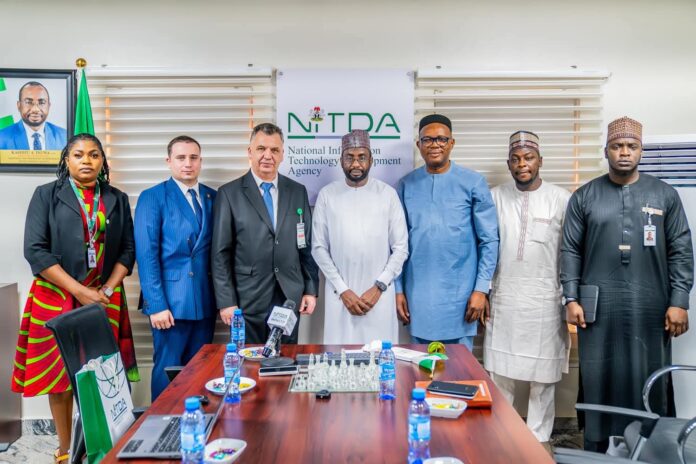The National Information Technology Development Agency (NITDA) has reiterated its commitment to driving digital transformation as part of the ongoing efforts to implement the present administration’s Renewed Hope Agenda.
By Chimezie Godfrey
The National Information Technology Development Agency (NITDA) has reiterated its commitment to driving digital transformation as part of the ongoing efforts to implement the present administration’s Renewed Hope Agenda. A key aspect of this initiative focuses on enhancing governance and ensuring effective service delivery.
In line with President Muhammadu Buhari’s directive to digitize 75% of government services by 2027, NITDA is working on creating a one-stop portal that will consolidate all government services. This ambitious target is now a focal point for various stakeholders in the country.
NITDA’s Director-General, Kashifu Inuwa CCIE, made these remarks when he hosted a delegation from the Ukrainian Embassy in Nigeria, led by Ambassador Mr. Ivan Kholostenko. The two sides discussed potential collaborations aimed at improving productivity, transparency, and trust in government processes during a meeting at the Agency’s corporate headquarters in Abuja.
Although previous efforts, such as the OneGove.net initiative, have aimed to centralize government services, Inuwa emphasized NITDA’s critical role in shaping the framework for the establishment of this digital government platform. He acknowledged that progress had been slow but highlighted that renewed commitment and extensive research into global best practices have reignited the pursuit of the digital transformation agenda.
“We have been doing research on how the UK, Kenya, and other countries have achieved this, so I believe we can learn from you as well to see how we can build our own,” Inuwa explained. “While such models are not entirely transferable between nations, we can learn from their experiences to develop a framework that works for Nigeria.”
In his proposal, Inuwa underscored the importance of legal frameworks to support the initiative. He revealed that NITDA had identified several international models that allow government agencies to deliver services through Application Programming Interfaces (APIs). Some countries, he noted, offer these services exclusively through designated portals, underpinned by specific laws.
“If we want to achieve this, we need to have these laws in place and kickstart the process of enacting the laws in order to facilitate a smooth and effective digital transformation,” he stated.
NITDA is also working closely with the International Telecommunication Union (ITU) to align Nigeria’s efforts with global digital governance standards. This collaboration is expected to offer valuable insights that will help shape the country’s digital transformation roadmap.
“This initiative is seen as a critical step towards enhancing efficiency, reducing corruption, and promoting transparency in government operations. By leveraging global best practices in alignment with national policies and digital transformation goals, Nigeria will have a smart, seamless, and citizen-friendly government service experience,” Inuwa concluded.
During the meeting, Ambassador Kholostenko shared insights into Ukraine’s digital governance model. He explained that the country’s Diia platform is a comprehensive digital ecosystem that encompasses state registers, databases, and a wide range of government services. The platform enables citizens to access various services from a single location.
“We are interested in expanding and helping other countries to make a digital state, reduce bureaucracy, reduce time for getting state services, and, of course, reduce corruption risks because human-to-human interaction is minimal,” Kholostenko stated, adding that Ukraine’s Ministry of Digital Transformation is fully committed to supporting other nations in developing similar systems.
This collaboration between Nigeria and Ukraine marks a significant step towards achieving a unified and efficient digital government services platform, with a shared vision of reducing inefficiencies and fostering transparency across government systems.




